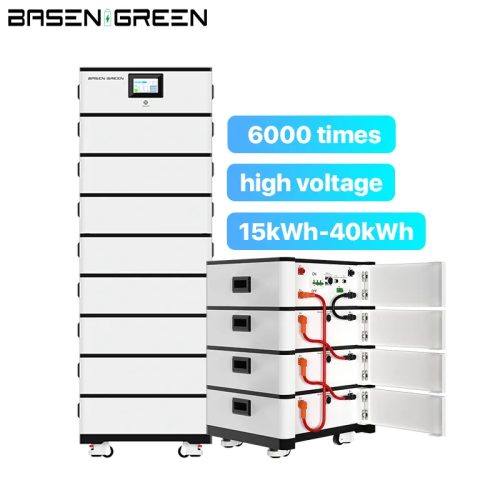High-Voltage vs. Low-Voltage Batteries for Home Energy Storage
Choosing the right type of battery for home energy storage can be a pivotal decision for homeowners. In this exploration, we’ll dive into the nuances of high-voltage and low-voltage rechargeable batteries to ascertain which is more suitable for your home energy needs.
Understanding High-Voltage Batteries
What are High-Voltage Batteries?
High-voltage batteries typically operate above 48 volts. They are becoming increasingly popular in residential energy storage systems, especially in homes with higher energy demands.
Advantages of High-Voltage Batteries
- 1.Efficiency and Power Handling: They offer higher efficiency with lower current flows, reducing energy loss during power conversion.
- 2.Solar Compatibility: High-voltage batteries are often more compatible with modern solar panel systems.
- 3.Simplified Installation: These systems can be simpler to install due to fewer parallel connections.
- 4.Scalability for Future Needs: High-voltage systems are generally more adaptable to future technological advancements.
Drawbacks of High-Voltage Batteries
- 1.Higher Initial Investment: The advanced technology in high-voltage batteries often comes with a higher upfront cost.
- 2.Safety Considerations: Additional safety measures and professional installation may be necessary due to the higher voltage.
Exploring Low-Voltage Batteries
What are Low-Voltage Batteries?
Low-voltage batteries typically range from 12 to 24 volts and have been the traditional choice for smaller homes or those with modest energy needs.
Benefits of Low-Voltage Batteries
- 1.Cost-Effectiveness: They are generally more affordable, offering a budget-friendly solution for home energy storage.
- 2.Availability: There is a wide range of low-voltage products due to their long-standing market presence.
- 3.Ease of Handling: Low-voltage systems are often safer and simpler, making them suitable for DIY projects.
Limitations of Low-Voltage Batteries
- 1.Efficiency Challenges: Low-voltage batteries may experience higher energy losses, especially in AC power conversion.
- 2.Complexity in Scaling: Expanding a low-voltage system can be more complex, requiring intricate configurations.
Making the Right Choice for Your Home
Assessing Your Home’s Energy Needs
- 1.Energy Consumption: Evaluate your home’s energy usage to determine if a high-voltage system is necessary.
- 2.Budget Considerations: Factor in your budget – low-voltage batteries might be more viable for limited budgets.
- 3.System Compatibility: Consider the compatibility of the battery with existing or planned solar panels or other energy systems.
- 4.Space and Installation: High-voltage batteries typically require less space but may need professional installation, whereas low-voltage systems can be more DIY-friendly.
Conclusion
In conclusion, the choice between high-voltage and low-voltage batteries for home energy storage depends largely on your specific energy needs, budget, compatibility with other energy systems, space constraints, and personal preference for installation. High-voltage batteries are suited for homes with higher energy demands and for those seeking efficiency and scalability. Low-voltage batteries are ideal for cost-effective solutions and simpler setups, especially in smaller homes. Carefully consider these factors to make the most informed and suitable choice for your home energy storage needs.


